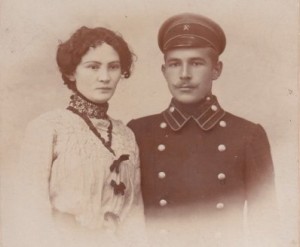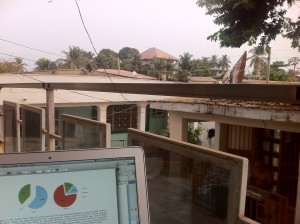We may not get many more languages in the world. New languages usually form in linguistic isolation and in a connected world this possibility is greatly reduced. All Languages constantly evolve, so change is inevitable, but a language branching into two will be unlikely. This has mostly been true for English. While the Roman empire had collapsed for long enough that Latin branched to become French, Italian, Spanish, etc, there wasn’t enough time between the dismantling of the British empire and the proliferation of telecommunications, only distributing long enough for a few minor variations across the Americas, Asia, Africa and the Pacific; perhaps not even enough to be considered different dialects.
An exception to the absence of new languages can be found in Creoles. When speakers of different languages come together and need to communicate they will often create a very simple vocabulary and grammar for interacting, known as a Pigin. Sometimes it will be based on one language, or sometimes a blend of two like ‘Russenorsk‘ a pigin drawing from both Russian and Norwegian vocabulary to enable trade in the fishing industry, with about 400 words; mostly fish-related words (there were few famous Russenorsk poets). When speakers maintain separate primary languages then the trade languages often remain a pigin. When the speakers adopt the pigin as a primary language, it quickly develops into a Creole – a full mixed-language – and achieves independent language status in just a generation or two, often retaining the name ‘Creole’ while continually evolving.
The renowned Russenorsk Poet, Radost Severormorsk, wooed his wife with his ballad "I enjoy you like a herring enjoys krill". Her joy is clear.
In North America in the 17th century, slaves from West and Central Africa begun learning an English-based pigin that quickly evolved into a Creole used throughout the region. It can still be found today in Jamaican Patois and, as I stumbled upon by accident a few years ago, in the islands off Belize (although the standard greetings are different, which I also stumbled over accidentally, to everyone’s confusion). There are even a few speakers left in the USA (now all elderly) in South Carolina and Georgia where it is called Gullah. For years people thought that Gullah was simply an impoverished English, not realizing that it was a full, rich language, one of the few to ever have been derived from English, and a unique window into one of the most important times in America’s history.
Freetown, the capital of Sierra Leone, was primarily settled by freed slaves from the Americas, also known as ‘Krios’. It draws on influences from dozens of languages, including many West African and European languages and (to confuse things a little) a separate English-based trade pigin that was already in use in West Africa. To this day, the Krios are recognized as both an ethnic and linguistic group in their own right. There is even a certain style of ‘Krio architecture‘. The language is widely spoken across the region, helped greatly by being the language of choice for much of the music broadcast across the nation (see below).That new languages can spring up so quickly from pigins, and that they come to independently develop grammars so similar to existing languages, has been the source of much debate among linguists, especially as evidence for the possible universal qualities of human language and its cognitive roots. While the jury is still out on the grammar, all linguists agree on the universal that the most interesting idioms in every language are to do with sex, relationships and insults (or all three). So I’m taking the chance to add 10 favorites to my previous report on ‘flashing’ (from memory so excuse the spellings):
1. id de han bag. A little hand-bag (one of those tiny just-under-the-armpit ones). It took me a while to work out the insult- if you go out only carrying a very small handbag then you are expecting a man to pay for everything. In other words, you use this phrase to acuse someone of being a bit prostitutey. Sounds odd, I know, but I was able to use the fallout from someone using this phrase to negotiate a better rental deal for our NGO there, Energy for Opportunity (long story).

The view from my balcony office in Aberdeen, Freetown. On the bottom right is my neighbor singing loud covers of Elton John hits in his underwear. He sung mainly in English and was half Russian ... I should have asked if he new Russenorsk
3. keep a stick behind door. As it sounds. Wild (or wild-ish) dogs can be a problem, so it’s a good idea to keep a stick handy by the door when you go out, just in case. The implication has nothing to do with dogs, of course – it means that a backup boyfriend or girlfriend should be kept at the ready.
4. take more than one man to fill box. Similar to the previous but just about keeping a spare (or extra) man around. Don’t make me spell it out…
5-8. dry, super slim, straight cut, old stock. Female figure types, meaning (in order): too thin/leathery, attractive, elegant, and (a friend carefully explained) someone who has ‘earned their body’.
9. boxer. Someone who is tight with their cash – the closed fist of a boxer not letting go of money.
10. greased. Damaged. I can’t work out the history of why ‘greased it’ means ‘damaged it’, but it’s just so much fun to use: “I greased the car”, “I greased the test”, etc.
I’m sure I’m barely scratching the surface. Beyond the idioms, the grammar patterns differently too. One thing that stood out was the use of ‘for’ as an infinitive. So instead of saying “I want to go” you would say “I want for go”. The ‘to’ / ‘for’ alternation is pretty arbitrary, but for some reason the little changes in the actual grammar stood out more than the changes in the words themselves. You can see this in (Lady) Laurish’s ‘Lose your love’ video clip
where she says “so try for understand I don’t want for lose your love”
It’s a pretty good intro to Krio, although she speaks more on the English side of things.
For a more deep Krio, check out the Krio figures of speech:
Did you notice the (cleaner) variation on the ‘stick behind door’ idiom? Don’t believe for a second that’s the first thing that people will think ;-)
And just to balance out the languages, here is Sorie Kondi singing “Without Money, No Family”
The first verse is sung in Loko, the second in Krio, and the third in Temne. There are at least a dozen commonly spoken languages across the country, all with their unique ways to insinuate and insult – wish I could share more about them all!
Rob
22 Mar 2012

